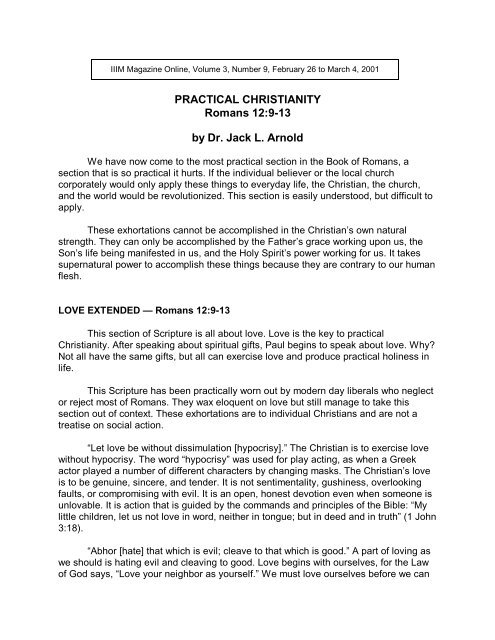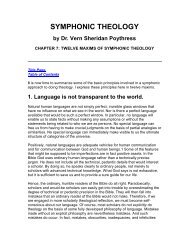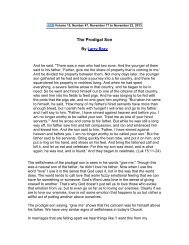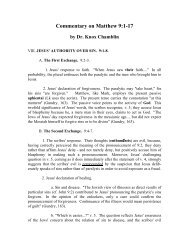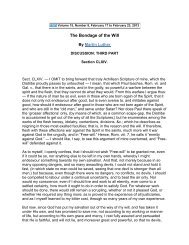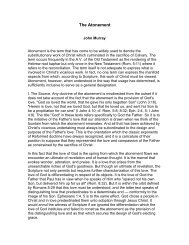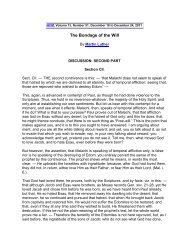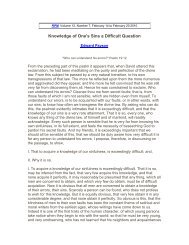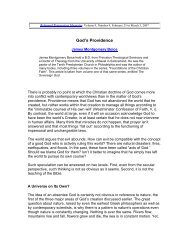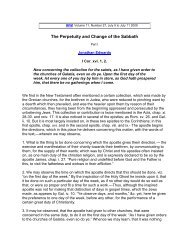PRACTICAL CHRISTIANITY Romans 12:9-13 by Dr. Jack L. Arnold
PRACTICAL CHRISTIANITY Romans 12:9-13 by Dr. Jack L. Arnold
PRACTICAL CHRISTIANITY Romans 12:9-13 by Dr. Jack L. Arnold
You also want an ePaper? Increase the reach of your titles
YUMPU automatically turns print PDFs into web optimized ePapers that Google loves.
IIIM Magazine Online, Volume 3, Number 9, February 26 to March 4, 2001<br />
<strong>PRACTICAL</strong> <strong>CHRISTIANITY</strong><br />
<strong>Romans</strong> <strong>12</strong>:9-<strong>13</strong><br />
<strong>by</strong> <strong>Dr</strong>. <strong>Jack</strong> L. <strong>Arnold</strong><br />
We have now come to the most practical section in the Book of <strong>Romans</strong>, a<br />
section that is so practical it hurts. If the individual believer or the local church<br />
corporately would only apply these things to everyday life, the Christian, the church,<br />
and the world would be revolutionized. This section is easily understood, but difficult to<br />
apply.<br />
These exhortations cannot be accomplished in the Christian’s own natural<br />
strength. They can only be accomplished <strong>by</strong> the Father’s grace working upon us, the<br />
Son’s life being manifested in us, and the Holy Spirit’s power working for us. It takes<br />
supernatural power to accomplish these things because they are contrary to our human<br />
flesh.<br />
LOVE EXTENDED — <strong>Romans</strong> <strong>12</strong>:9-<strong>13</strong><br />
This section of Scripture is all about love. Love is the key to practical<br />
Christianity. After speaking about spiritual gifts, Paul begins to speak about love. Why?<br />
Not all have the same gifts, but all can exercise love and produce practical holiness in<br />
life.<br />
This Scripture has been practically worn out <strong>by</strong> modern day liberals who neglect<br />
or reject most of <strong>Romans</strong>. They wax eloquent on love but still manage to take this<br />
section out of context. These exhortations are to individual Christians and are not a<br />
treatise on social action.<br />
“Let love be without dissimulation [hypocrisy].” The Christian is to exercise love<br />
without hypocrisy. The word “hypocrisy” was used for play acting, as when a Greek<br />
actor played a number of different characters <strong>by</strong> changing masks. The Christian’s love<br />
is to be genuine, sincere, and tender. It is not sentimentality, gushiness, overlooking<br />
faults, or compromising with evil. It is an open, honest devotion even when someone is<br />
unlovable. It is action that is guided <strong>by</strong> the commands and principles of the Bible: “My<br />
little children, let us not love in word, neither in tongue; but in deed and in truth” (1 John<br />
3:18).<br />
“Abhor [hate] that which is evil; cleave to that which is good.” A part of loving as<br />
we should is hating evil and cleaving to good. Love begins with ourselves, for the Law<br />
of God says, “Love your neighbor as yourself.” We must love ourselves before we can
love others. How? By hating the evil that is in us and holding fast to the good that God<br />
produces in us. Evil is not determined <strong>by</strong> what we think is evil, or <strong>by</strong> what our<br />
upbringing called evil, but <strong>by</strong> the Word of God. It is only as we walk, think, and look at<br />
life in the light of the revelation of the Word of God that we can hate what is evil and<br />
hold fast what is good:<br />
“Abstain from all appearance of evil” (1 Thess. 5:22)<br />
“Finally, brethren, whatsoever things are true, whatsoever things are<br />
honest, whatsoever things are just, whatsoever things are pure,<br />
whatsoever things are lovely, whatsoever things are of good report; if<br />
there be any virtue, and if there be any praise, think on these things”<br />
(Phil. 4:8).<br />
It is impossible to have love without having hate, for these are opposites. If we<br />
are to love good, then we must also hate evil. Every Christian is to imitate his God, who<br />
hates sin and loves the sinner who receives Christ. Our God is a God of hate and wrath<br />
as well as a God of love and mercy. Christians must learn to hate evil in themselves<br />
and in others: “Ye that love the Lord hate evil” (Ps. 97:10). There is a real tendency to<br />
rationalize sin in our lives, but we must face it objectively and ask God to begin to<br />
deliver us from it.<br />
In a short article, “Love and Hate,” the Rev. R. J. Rushdoony wrote:<br />
“In these days, when men are making a cure-all out of love and demand<br />
total love of all things, the words of Scripture are a refreshing and healthy<br />
antidote. Jesus Christ, in speaking to the church of Ephesus, commended<br />
them because they hated what He hated: ‘But this thou hast, that thou<br />
hatest the deeds of the Nicolaitanes which I also hate.’ (Revelation 2:6).<br />
There are many such declarations in Scripture: all assume the necessity<br />
for hating as a part of the privilege of love. If we love that which is good,<br />
we will hate that which is evil. If we love and honor the joys and sanctity of<br />
marriage and family life, we will hate everything which works to destroy it.<br />
If we love our Christian faith and heritage, we will hate the anti-Christian<br />
forces which wage war against us. And if we love our country, we will hate<br />
those who subvert it, wage war against it or seek to destroy it.”<br />
Love and hate are different sides of the same coin. Those who claim to be above<br />
hate are also beyond love. They do not feel strongly enough about anything to love it<br />
and hate its opposite. Such people are emotionally and intellectually sterile.<br />
The love mongers, who preach endlessly about loving everything, and “love” as<br />
a way of salvation, are really not talking about love. They are asking for the toleration<br />
2
of evil. They are asking us to tolerate evil, to give it freedom to destroy us, and to<br />
destroy our Christian law and order. Anyone who asks us to tolerate evil is actually<br />
asking us to love evil and to hate good, but they are not honest enough to say so. For<br />
example, one writer who recently wrote a book pleading for love and toleration for<br />
homosexuals, child molesters and every other kind of pervert, spoke of the Bible and<br />
Christianity with savage hatred, and said, of Christian morality, “To be chaste is no<br />
longer praiseworthy; rather, it is something unnatural, and therefore almost intolerable.”<br />
Such people pretend to be against hate, but they are simply preaching the love<br />
of evil, and the hatred of all that which is holy and good. Their purpose is to convert<br />
you from the love of God to the love of evil.<br />
“Be kindly affectioned one to another with brotherly love; in honour preferring<br />
one another.” Among Christians there is to be a familial love and affection. This is<br />
kindness, graciousness, and mutual respect for another’s person and property.<br />
“Forbearing one another, and forgiving one another, if any man have a<br />
quarrel against any; even as Christ forgave you, so also do ye” (Col.<br />
3:<strong>13</strong>).<br />
This also involves honoring other Christians more than ourselves: giving another the<br />
preferred seat, the preferred honor, and the preferred place.<br />
“Let nothing be done through strife or vainglory; but in lowliness of mind<br />
let each esteem other better than themselves. Look not every man on his<br />
own things, but every man also on the things of others” (Phil. 2:3-4).<br />
This is having an attitude that every other Christian is somehow better than I and has<br />
something to teach me.<br />
“Not slothful in business.‘’ This is a poor translation in the King James Version.<br />
This verse has nothing to do with good business ethics or practices, although a<br />
Christian should be above reproach in all his business dealings. It should be<br />
translated, “Never flag in zeal,” or “Be not lazy as to what you ought to do” (Luther). A<br />
Christian is not to be lazy in anything, but especially not in his spiritual life. Spiritual<br />
laziness is the cause of spiritual defeat. The average Christian probably spends more<br />
time grooming his or her body than he does grooming his soul for spiritual beauty. How<br />
much time do we give daily for study of the Word and prayer? Do we have time set<br />
aside for Christian service?<br />
There is much talk about the importance of tithing our money, but little mention<br />
of the greater importance of tithing our time. How different our life would be if we gave<br />
the Lord a tenth of our time every day. This would amount to two hours and twenty-four<br />
3
minutes. If this were the standard, most of us would merely be playing at being<br />
Christians. No wonder God says, “Be not lazy in your spiritual life.”<br />
“Fervent in spirit.“ The Christian is to be burning or glowing in his human spirit<br />
as he is controlled <strong>by</strong> the Holy Spirit. He is to radiate the person of Jesus Christ in his<br />
life.<br />
“Now when they saw the boldness of Peter and John, and perceived that<br />
they were unlearned and ignorant men, they marvelled; and they took<br />
knowledge of them, that they had been with Jesus” (Acts 4:<strong>13</strong>).<br />
Every Christian should have a zeal and enthusiasm for Christ that is obvious to the<br />
world. If the Christian is not excited about Jesus Christ, how can he ever expect the<br />
world to get excited?<br />
“Serving the Lord.” A Christian is never to falter in his service for Jesus Christ;<br />
he is always to be available. Genuine love is available and ready to minister. We must<br />
all learn to serve the Lord in faithfulness, not for the glory and praise of man, but for the<br />
glory and praise of God: “Moreover it is required in stewards, that a man be found<br />
faithful” (1 Cor. 4:2).<br />
Have you ever noticed how moody we often are in our service for the Lord? We<br />
want to serve only when we feel like it. A call comes for some kind of Christian service<br />
and we say, “Well, I’d like to, but I’m not in the mood right now.” After we have<br />
undertaken a task for a while we may say, “I’m tired of doing this. Let somebody else<br />
take it for a change.”<br />
“Rejoicing in hope.” The Christian rejoices inwardly because of the assured fact<br />
that he will someday be in heaven with Jesus Christ. Hope is the anticipation of future<br />
delight, with some expectation of obtaining it. Hope is the onward look that sees<br />
something in the present that is expected to bring delight in the future. We are<br />
commanded to be rejoicing Christians: “Rejoice evermore” (1 Thess. 5:16).<br />
Ray Stedman, pastor of Peninsula Bible Church in Palo Alto, California,<br />
described two kinds of Christians: Those who get up in the morning and say, “Good<br />
morning, Lord!” and those who get up in the morning and say, “Good lord, it’s morning!”<br />
“Patient in tribulation.” The Christian is to have an attitude of patient endurance<br />
in the midst of tribulation and trials. He is to exhibit confidence that this will all work<br />
together for good and that God is on the throne. This produces patience.<br />
“For I reckon that the sufferings of this present time are not worthy to be<br />
compared with the glory which shall be revealed in us” (Rom. 8:18).<br />
4
“For our light affliction, which is but for a moment, worketh for us a far<br />
more exceeding and eternal weight of glory” (2 Cor. 4:17).<br />
Even though the present circumstances might be dark and unpleasant, the Christian is<br />
aware that God is at work in these circumstances and that they have been brought into<br />
his life to mature him spiritually and prepare him for heaven. Therefore, the Christian is<br />
not to murmur or complain or blame others in the midst of trials and tribulations.<br />
“Continuing instant in prayer.” The Christian is to persevere in prayer. He is to<br />
pray all the time: “Pray without ceasing” (1 Thes. 5:17). His attitude should be one of<br />
prayer, and he should also find time daily to pray in a concentrated way to his Heavenly<br />
Father. Prayer is hard work, but it pays great dividends. It is our primary way of<br />
communicating with God. He has spoken to us through his Word; we speak to him<br />
through prayer. Without prayer, we die spiritually, for no good relationship between two<br />
persons can exist on one-way communication. The devil would get us to stop praying,<br />
for prayer combats the forces of hell and makes the plan of God a reality in the<br />
Christian’s life.<br />
“Distributing to the necessity of the saints.” The Christian who has been blessed<br />
materially <strong>by</strong> God is to give liberally, gladly, and freely to Christians who have needs.<br />
Why? Because love is generous:<br />
“Charge them that are rich in this world, that they be not high-minded, nor<br />
trust in uncertain riches, but in the living God, who giveth us richly all<br />
things to enjoy; That they do good, that they be rich in good works, ready<br />
to distribute, willing to communicate; Laying up in store for themselves a<br />
good foundation against the time to come, that they may lay hold on<br />
eternal life” (1 Tim. 6:17-19).<br />
“Given to hospitality.” The Christian is to open his home to other Christians, not<br />
just being willing, but making a positive effort to entertain fellow believers.<br />
CONCLUSION<br />
The love that one Christian can show to another is simply a reflection of the fact<br />
that God is love. God manifested his love at the Cross where Christ died for sinners.<br />
If you will trust Christ as your personal Lord and Saviour, you will come to<br />
experience God’s love in your life. Will you ask God to draw you to Jesus Christ and<br />
grant you the grace to believe in him who alone can give you eternal life and the<br />
forgiveness of sin?<br />
5


